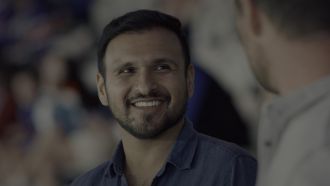Media release
From:
Research calls for routine social frailty screening to protect brain health
New research led by the Centre for Healthy Brain Ageing (CHeBA) has found that older adults experiencing social frailty – a lack of social connections, resources and support meet basic needs – face a significantly higher risk of developing dementia.
The study, published in The Journals of Gerontology: Series B, followed more than 850 Australians aged 70 and older over 12 years as participants in CHeBA’s Sydney Memory and Ageing Study. It is one of the first long-term studies worldwide to show how specific measures of social frailty can predict the risk of developing dementia.
Researchers found that individuals identified as being socially frail using specific screening tools were up to 50% more likely to develop dementia, even after accounting for other factors such as physical and psychological frailty.
“Social frailty has been largely overlooked in dementia research. Our findings suggest it’s not only a key risk factor, but one we can identify early and potentially change,” said Dr Annabel Matison, Post-Doctoral Research Fellow at CHeBA and lead author.
What exactly is social frailty?
Social frailty refers to a person’s vulnerability due to limited social resources and support, such as infrequent social contact, low participation in social or community activities, and poor satisfaction with family or financial circumstances. It is considered distinct from physical and psychological frailty, but may be just as important.
While physical frailty has been widely studied, social frailty has received far less attention despite being linked to higher rates of disability, cognitive decline and early death.
The study yielded several key findings that underscore the significance of this research, including:
- Social frailty significantly increased the risk of developing dementia, particularly when assessed using the Shah index, which includes financial and family satisfaction, social activities and volunteering, and frequency of contact with others.
- Low financial satisfaction emerged as a strong, independent predictor of dementia.
- Importantly, social frailty was a predictor even in people who were cognitively healthy at the start of the study.
Screening to support dementia prevention
Early identification of social frailty could lead to targeted support and interventions, such as social prescribing or community-based programs, to reduce dementia risk and improve overall wellbeing.
“We know that staying socially connected is vital for brain health, but what’s missing in practice is a simple, evidence-based checklist that doctors can use in the clinic,” said CHeBA’s social health expert and co-author Dr Suraj Samtani. “Our research shows that the social frailty index has real potential to fill that gap - helping GPs quickly identify older adults who are at higher risk, and giving families and clinicians the chance to act before dementia takes hold.”
Dr Samtani added: “This is where the future of dementia prevention needs to head. Alongside lifestyle measures like diet and exercise, we want to see social prescribing become routine - where doctors prescribe meaningful social activities, just as they prescribe medication, to protect and strengthen brain health.”
“Our ultimate aim is to see brief social frailty screening tools used in clinics and made available for self-assessment, said Dr Matison. This could help older adults, their families, and health professionals take action before cognitive decline begins.”
The researchers emphasised the need for these findings to be validated in diverse populations and to develop evidence-based screening tools suitable for use in primary care or by individuals themselves.
They also recommend that social frailty be included in future public health strategies aimed at dementia prevention.
From the Lab to the Marvel Stadium
Premiering 24 November 2025 on Disney+, Chris Hemsworth: A Road Trip to Remember explores dementia, memory and healthy ageing through the lens of Hemsworth’s personal journey, as he learns how lifestyle and social factors can slow cognitive decline.
For Dr Suraj Samtani, a Postdoctoral Research Fellow at UNSW’s CHeBA and co-lead author on the study, translating that science to a global audience through the National Geographic documentary has been both surreal and deeply meaningful.
“As a scientist, it’s a dream come true to be part of a National Geographic documentary,” said Dr Samtani. “We’re lucky if a handful of people read our research articles. Having the global reach of Disney and Chris Hemsworth means we can share our dementia research with millions. It’s why I do this work - to help people. Science is not just about research; it’s meant to be shared.”
Dr Samtani filmed with Hemsworth at Marvel Stadium in Melbourne, where the two discussed the importance of mental wellbeing and social connection.
“Chris is incredibly down-to-earth,” said Dr Samtani. “But what stayed with me was his sincerity. He genuinely wants to promote healthy ageing and reduce stigma around dementia.”
“When we spoke about his father and his own future, he was open and vulnerable. Seeing that side of him was inspiring. I hope it encourages men to talk more about their feelings and helps families speak more openly about dementia.”
In another moving moment, the production team recreated Hemsworth’s childhood home to look exactly as it did in the 1990s. “It felt like stepping into a time machine,” said Dr Samtani. “When Chris and his family walked in, it was incredibly emotional — a beautiful, nostalgic moment.”
A Shared Message of Hope
Both the research and the documentary share a common message: there is hope.
“If you are living with dementia or caring for someone who is, you are not alone,” said Dr Samtani. “Through awareness, social engagement and support, we can slow cognitive decline and help people live well.”
Dr Samtani also expressed heartfelt thanks to Chris Hemsworth and his family.
“Their openness and honesty will help millions understand dementia and spark meaningful conversations around the world. The documentary is beautiful and deeply moving.”
Chris Hemsworth: A Road Trip to Remember is produced by Protozoa, Nutopia, and Wild State for National Geographic.
Multimedia





 Australia; NSW
Australia; NSW



